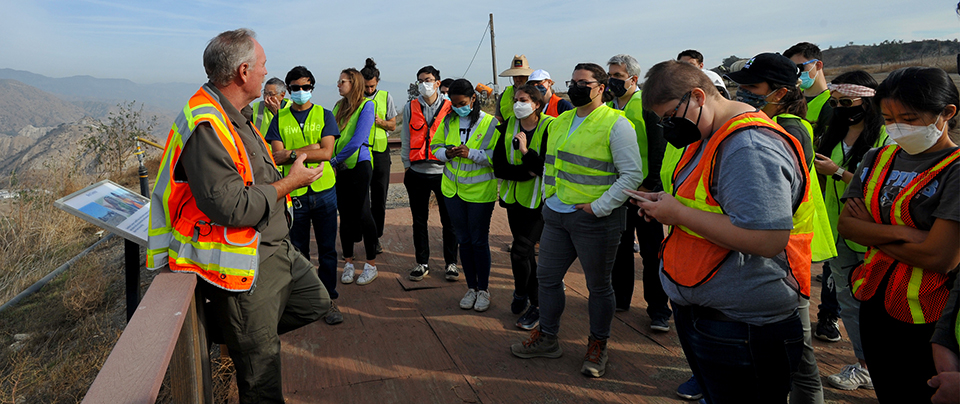Autonomy Research Center for STEAHM Awarded $150k Grant

David Thompson briefing CSUN and UCLA students in November 2021. Photo courtesy of David Perez.
The Autonomy Research Center for STEAHM (ARCS) at California State University, Northridge recently was awarded a $150,000 one-year planning grant from the National Science Foundation’s Future of Work at the Human-Technology Frontier program. The grant was awarded to support Workers and Technology Together (WATT), a CSUN and NASA research project focusing on the waste management industry.
Food waste was responsible for about 20% of the methane emissions released in global landfills from 2010-16, according to a climate change report from the Intergovernmental Panel titled “Climate Change and Land.” The Intergovernmental Panel is an organization associated with the United Nations tasked with bringing awareness to climate change. The ARCS project team hopes to improve current harmful methods of processing organic waste and increase the safety of workers.
“The WATT project has important policy and legal consequences,” said Farshad Ghodoosi, an ARCS faculty member, WATT project team member, and assistant professor of business law at CSUN. “It lays at the intersection of a pivotal discussion about the relationship between automation and human interaction with technology.”
“It sheds light on the future of the firm as organizations move toward more automation,” Ghodoosi said. “The legal, ethical, and policy impacts of automation have yet to be thoroughly studied. The WATT project is contributing to that discussion.”
The ARCS program is designed to present CSUN students and faculty from disciplines across the university with the opportunity to collaborate with NASA on projects supporting NASA research in autonomous systems.
The WATT project team will integrate multiple academic disciplines to identify “pain points,” or weaknesses, within the waste management industry and develop the framework for future solutions, and train workers in skills needed to work with autonomous systems. The team will consist of students, faculty, and experts from fields such as mechanical engineering, art, and design, business law, computer science, and manufacturing systems.
Team members also will have the opportunity to collaborate with individuals such as UCLA environmental law professor Eugene Tseng and waste management company Anargeria. Tapping into that expertise, the team will determine different pathways to improving waste management capture and worker safety.
In addition to the project responsibilities and goals, the WATT team will be identifying future areas of needed research to propose to the National Science Foundation in 2022.
For more information on WATT and to keep up with current project goals, visit ARCS’ zero waste project page.

 experience
experience